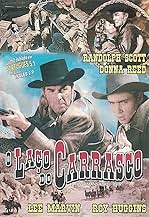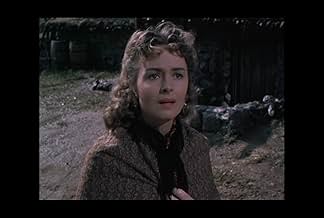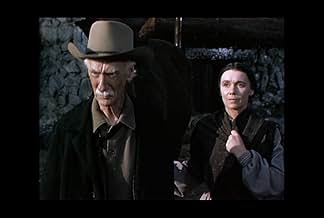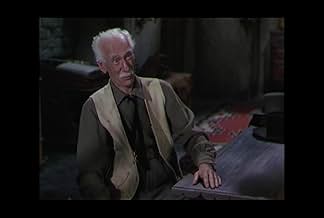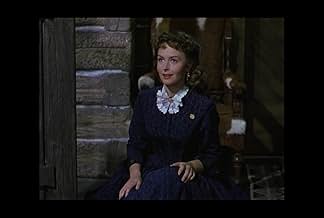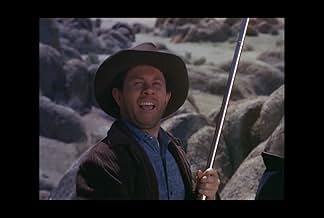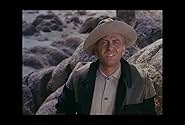Aggiungi una trama nella tua linguaA Confederate Major and his troops are falsely led to believe the Civil War is not over, and become wanted men after they attack a Union Army wagon train in Nevada.A Confederate Major and his troops are falsely led to believe the Civil War is not over, and become wanted men after they attack a Union Army wagon train in Nevada.A Confederate Major and his troops are falsely led to believe the Civil War is not over, and become wanted men after they attack a Union Army wagon train in Nevada.
- Regia
- Sceneggiatura
- Star
- Union Captain
- (non citato nei titoli originali)
- Drifter
- (non citato nei titoli originali)
- Hank Fletcher
- (non citato nei titoli originali)
- Stage Driver
- (non citato nei titoli originali)
- Drifter
- (non citato nei titoli originali)
Recensioni in evidenza
That fact is brought home when a group of "deputies" lead by Ray Teal and Guinn Williams go out hunting the Confederates. They're not law officers in fact, but raiders looking to steal the gold and kill Scott and his crew. Scott and his crew take shelter in a stagecoach station and the fun begins.
Everybody's in conflict here. Randolph Scott has eyes for stage passenger Donna Reed and her fiancée Richard Denning doesn't like it. Lee Marvin, who's one of Scott's men, also has eyes for Reed and willing to take a direct approach. The folks who run the station, Clem Bevans and Jeanette Nolan, don't like being caught up in the shooting at their station, but don't like the Confederates in particular as their Union sympathizers and Nolan's husband and son have both been killed in the war. Even the bad guys are arguing over just what approach to take in dealing with the Confederates and none of them trust the others. All this with the two groups shooting at each other.
For 81 minutes a lot of plot is packed in and it's nicely done. Very tight editing, not a word or action wasted. Randolph Scott stands rigidly as the moral centerpiece of the film. Donna Reed, a year away from her Academy Award in From Here To Eternity, does well as a former Union Army nurse going west with her fiancée Richard Denning whom she learns is not all he seems. Lee Marvin gives a harbinger of things to come with his portrayal of a man quite ready and eager to become an outlaw.
One of Randolph Scott's best westerns.
The story written by Huggins concerns the final days of the tumultuous Civil War that not only split the nation asunder, but families and friends as well. Major Matt (Scott) is in command of a small band of rebel soldiers whose assignment is to hijack a union gold shipment in far off Nevada and take no prisoners. They succeed only to learn that Lee surrendered to Grant several weeks earlier. What to do? The major and his rebels decide to keep the gold and determine what to do with it later. The only rascal amongst the rebels is Ralph, an early role for Lee Marvin, who as usual steals the show. It seems his meanness has only grown as a result of all the violence he has experienced during the war. His killer proclivities have come to dominate his psyche. Though old pals in the saddle, Ralph and the Major are continually at each other's throats. Also a member of the rebels is a youngster who has not yet tasted blood, Jamie (Claude Jarman Jr. who first scored big as a twelve-year-old in "The Yearling").
As the rebels make their getaway, knowing that they will be hunted down as murderers and traitors by the Yankees, they are set upon by a gang of outlaws who claim to be seeking justice but who really want the gold. The rebels are chased to an outpost via stagecoach where they hold up in what turns out to be a standoff. The leader of the outlaw gang is Quincey, portrayed by veteran actor Ray Teal in one of his best roles. He was always a reliable actor who could be counted on to give a good performance. But this time he goes beyond the expected and turns in one of the best acting jobs ever. Today he is most famous for playing Sheriff Roy Coffee in the ever popular "Bonanza" TV series. Another surprise is to see Guinn 'Big Boy' Williams, who usually played good old boy types, half-comic, half tough guy, as one of the meanest hombres around, Smitty. He is more sadistic and cruel than Lee Marvin in this film, which is saying a lot. Sweet Donna Reed is, well, sweet, but handles the part of a nurse, Molly, engaged to a slime ball, Lee Kemper (Richard Denning of TV's Mr. North fame), beautifully. Jeanette Nolan and Clem Bevans are effective as daughter and father of a young man who died in battle after his father had been killed in the war. The lead role is filled admirably by Randolph Scott. He captures all the nuances and contradictions of Major Matt while remaining charming enough to capture the heart of Nurse Molly. The rest of the cast including the redoubtable Frank Faylen provides the necessary support for this excellent western.
The title "Hangman's Knot" is metaphoric. Literally, the knot is tied to hang Cass (Faylen), but the knot also stands for the symbolic noose around the neck of each character for various reasons explored by the interaction of a great cast.
If you like western movies, you'll enjoy this one. Scott and Marvin are good with Marvin standing out in almost every scene he's in, especially with Donna Reed and I really liked Claude Jarman Jr.'s performance playing the young man who's reluctant to pull the trigger and all of his scenes interacting with Jeanette Nolan (Mrs. Margaret Harris) and Clem Bevans (The Station manager and Nolan's father) are great. Plot is one that I've never seen in a western genre film before, Confederate soldiers don't know that the war is over and are on a mission to steal gold from Union troops, the lone solder from the Union detachment tells the confederate soldiers that the war had been over for a month just before he dies placing the men in a bad predicament.
This isn't a bad western, but its not one that I would recommend to individuals unless they are fans of the genre because it follows the tried and true western plot from beginning to end. Action starting off the movie with lots of drama and a little action to drive the plot along until you come to the inevitable shootout and fight to bring the story to its conclusion. Saying that may make it sound like I don't like the movie which isn't true, I do like it, the acting is great and the plot and dialogue stands out, it just doesn't contain anything that would make it stand out in such a way where individuals who are not fans of the genre would find it appealing. If you want a movie that will entice you to start watching the genre, start with something like The Cowboys with with John Wayne or Quigley Down Under with Tom Selleck, both of which I think will keep anyone's attention, but if you have seen everything that Selleck and Elliot has offered in the 90s and you want to see how the OG boys from the 40s and 50s did it, then you can't go wrong watching this.
They don't come much more taut than this, and its success only brings into question as to why director Roy Huggins never made another film as director. This one really begins to approach the later Boetticher films, being set in an isolated way station, as several of Budd's films happened to be, with Randy as a Confederate officer, who has stolen Union gold, not knowing the war is over.
Outlaws, learning of the loot, besiege the soldiers at the way station, but just as much danger comes from within - the menacing soldier played by Lee Marvin. The cast is better than those in the then most recent Scott vehicles, including Donna Reed, Claude Jarman, Jr., Richard Denning and Guinn "Big Boy Williams. Randy's son C.H. Scott, in the book "Whatever Happened to Randolph Scott" speaks fondly of Donna Reed, as if she was a second mother, and says that she and his father never lost touch over the years, and were devoted to each other.
Omitting the Boetticher films, this one is clearly the strongest Scott offering of the 1950s. That Huggins never directed a feature film again (he did direct a 1970 TV movie) is more our loss than his. Huggins did quite well in the long run, with items like Maverick, Rockford Files and The Fugitive in his future.
With much of the film set within the way station, Huggins manages to keep the tension high as Scott has to deal with the group of bounty hunters outside (led by Ray Teal in a rousing performance) and the wayward loose cannon Ralph, the Lee Marvin character. Lee must have impressed producer Scott as he got a much showier role in the first Scott-Boetticher classic SEVEN MEN FROM NOW. Meanwhile, Scott must serve as surrogate big brother of Claude Jarman Jr, no longer the little boy of THE YEARLING and in fact nearly as tall as the film's lead star.
Richard Denning also impresses in his part as Donna Reed's fiancée, a character as weak-willed as the fiancée in the later Boetticher film THE TALL T. At first willing to call attention to an attempted escape by Scott and company (despite giving his word otherwise), he later bargains to give them an alternate plan of escape - in exchange for two bars of the captured gold.
My favorite of Scott's 50's westerns prior to his Boetticher films and dollar for dollar, the equal of many much bigger budgeted items from the likes of Wayne and Cooper.
Incredible to think that this fine Western was the only effort to have been directed by Roy Huggins; because it's exactly that, damn fine. He would go on to direct notable work in TV such as The Virginian, The Rockford Files, Maverick and The Fugitive, but it seems that he wanted to put down a marker that he could in fact direct a feature length film, and although it only runs at a respectable 80 minutes, he must have been real satisfied with the finished product. Huggins is backed up by genre legend Randolph Scott in the lead role of Major Matt Stewart, with Scott providing the sort of performance that reminds us of his excellent work for Budd Boetticher in Ride Lonesome, The Tall T and Comanche Station etc. Donna Reed (lovely as ever), Lee Marvin (another fine loose cannon job), Richard Denning and Frank Faylen all beef up the cast, and although some of the other supporting players do not quite shine so bright, they do, however, earn their corn and don't harm the movie.
The film itself is structured real well, we open with a fantastic sequence as the "Rebs" attack the Union troop, with Charles Lawton Jr's photography expertly capturing the Lone Pine vista in Technicolor glory. From here we are centred inside the way station in what at first appears to be your standard Rio Bravo set up, this set up could easily have failed if the characters inside the building were dull and very uninteresting. Thankfully Huggins, who wrote the story as well as directing it, gives us characters of interest with little offshoots of conflicts to further enhance the plot. This makes for a tense build up until we lurch towards the inevitable showdown where the rouges gallery of thugs outside - who want the gold at any cost to life - plot with hungry menace.
It's not perfect by any stretch of the imagination, as some B movie traits and budgetary tone downs are evident, but the quality is still impressively high. From the direction and photography to the performances of the leads; Hangman's Knot is an essential viewing for the discerning Western fan. 8/10
Lo sapevi?
- QuizAfter the scene of Lee Marvin holding Donna Reed against the wall, she was so terrified by him that she did not let him come near her on and off the set.
- BlooperWhen the Confederates ambush the Union gold shipment, they use dynamite. The film is set in 1865, but dynamite was not patented by its inventor, Alfred Nobel, until 1867. Dynamite was not in use during the American Civil War by either side.
- Citazioni
Lee Kemper: You got 'em confused.
[Lee laughs]
Lee Kemper: They'll a-find out though and get their hands on it, there ain't gonna be nobody left alive in here to tell. You got any plans?
Major Matt Stewart: Mm-hmm. We go out shooting.
- ConnessioniReferenced in Hollywood Remembers Lee Marvin (2000)
I più visti
- How long is Hangman's Knot?Powered by Alexa
Dettagli
Botteghino
- Lordo Stati Uniti e Canada
- 1.250.000 USD
- Tempo di esecuzione
- 1h 21min(81 min)
- Colore
- Proporzioni
- 1.37 : 1


